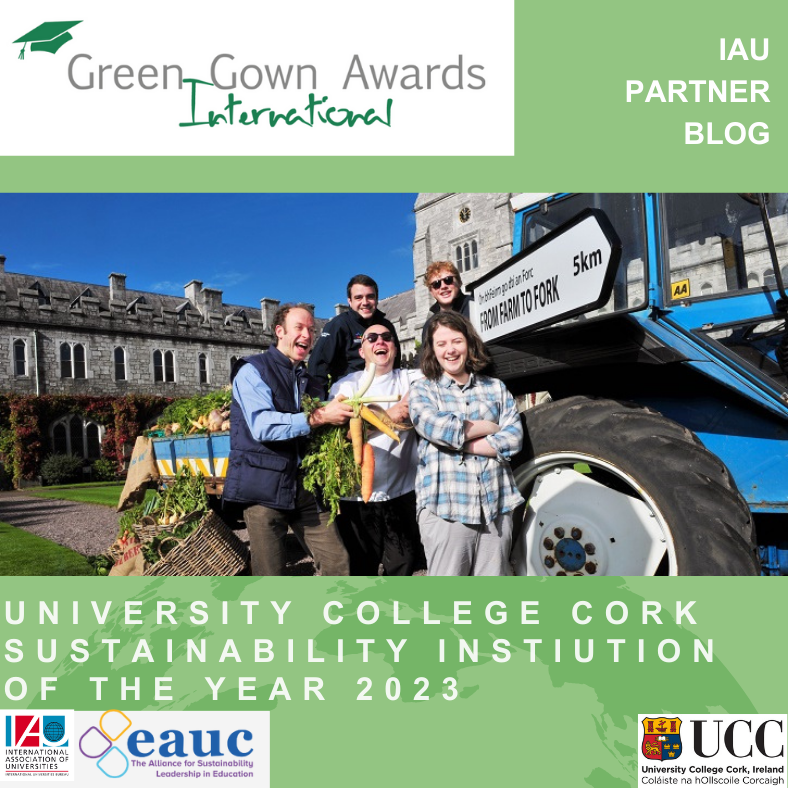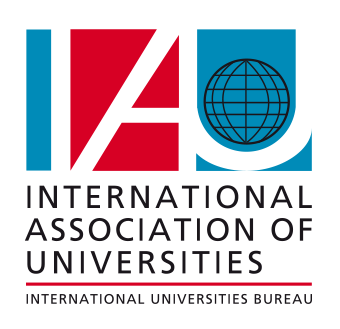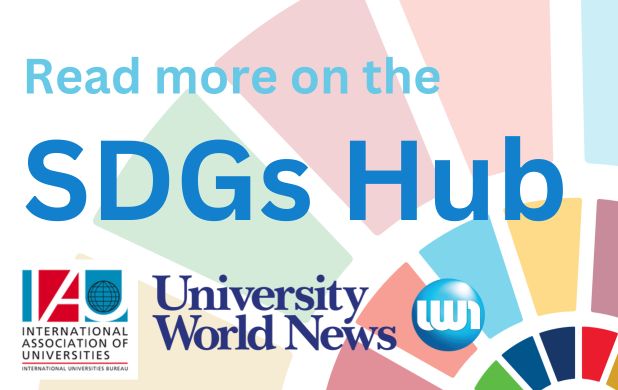
EAUC interviewed Maria Kirrane, Head of Sustainability and Climate Action at University College Cork, to find out more about their International Green Gown Award-winning green campus programme.
Can you tell us a bit more about your Green Campus Programme and its impact?
In operation since 2007, our Green Campus Programme is student-led, research-informed and practice-focused. Highlights include the establishment of the University’s Saver Saves Scheme for energy reductions, the development of a teaching toolkit aligned to the United Nation’s Sustainable Development Goals, the establishment of a Green Campus Living Laboratory Programme, the decision to rewild most of the green space on campus and self-organised student climate assemblies.
We have reduced our overall carbon emissions by 26% (absolute reduction) and waste tonnage by 40%. In 2023, UCC completely banned the sale of disposable cups (of any kind) and plastic bottles on campus. In the first year of this initiative, we diverted more than 1 million disposable cups from landfill and significantly improved our recycling rates. The introduction of an AI toll for monitoring kitchen bins has resulted in an 18% reduction in food waste. Many of these achievements are down to the inclusion of sustainability criteria within all of our tendering processes. This ensures buy-in from service providers and a collaborative approach to the rollout of sustainability projects on campus.
How have different members of University College Cork played a role in?
Our Saver Saves scheme sees Green Teams established within different schools and units across campus. The scheme acts as a “revolving fund”, whereby the monetary savings from energy reductions remain with the team to reinvest in other environmental projects. This has been transformational in engaging the entire community through devolving decision making to building users. At a broader level, the community can engage with UCC Green Campus through the Green Campus Committee which is co-chaired by the Student Union and Environmental Society, the Green Forum, which is co-chaired by the President and Director of Buildings and Estates, and a newly established University Leadership Team Subcommittee on Sustainability and Climate Action. Thus, there are varying levels of engagement and multiple opportunities. Much of the activity is coordinated by a newly established Office of Sustainability and Climate Action, which is based within the President’s Office.
You won Sustainability Institution of the Year at the 2023 International Green Gown Awards. How have awards and accolades changed or influenced your work on sustainability?
Awards and accolades are a great way to celebrate the engagement of the whole community. For sustainability to really be transformational it has to become part of every role and every facet of university life. This means that students, staff and service providers must all be open to learning how to do their job in a different way. It can be a big ask and being able to celebrate significant achievements is a great way of rewarding these mostly voluntary efforts. Awards are also a great way of getting our story out there and demonstrating to others that change can happen. It also ensures that senior management see value in sustainability from a reputational perspective.
What piece of advice would you give to another college or university who are just starting out on their sustainability journey?
Our main piece of advice would be to just start somewhere! Identifying quick wins can be a really great way to drive greater engagement and get more people on board. From a management perspective you should always have long-term strategic plans in mind, as well as shorter term “quick-wins” that will drive buy-in from stakeholders. Try to identify the co-benefits of what you are implementing, for example some energy conservation projects might also improve wellbeing and comfort levels in a building. Sustainability is, to a large extent, a change management programme and doing your best to understand the culture within your institution and how to influence that will be essential. Having a bottom-up drive from students and staff and top-down buy-in from management can really drive transformation.
More information is available at https://www.ucc.ie/en/sustainability-climate-action/
University College Cork are an EAUC member and IAU member.
You can apply for a Green Gown Award:
International Green Gown Awards – Deadline: 29th April 2024
UK & Ireland Green Gown Awards – Deadline: 5th June 2024
Australasian Green Gown Awards – Deadline: 26th June 2024
This interview was originally published on EAUC’s Blog, April 2024, reposted with permission. Photo credits: University College Cork.


